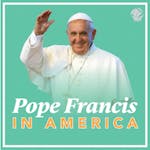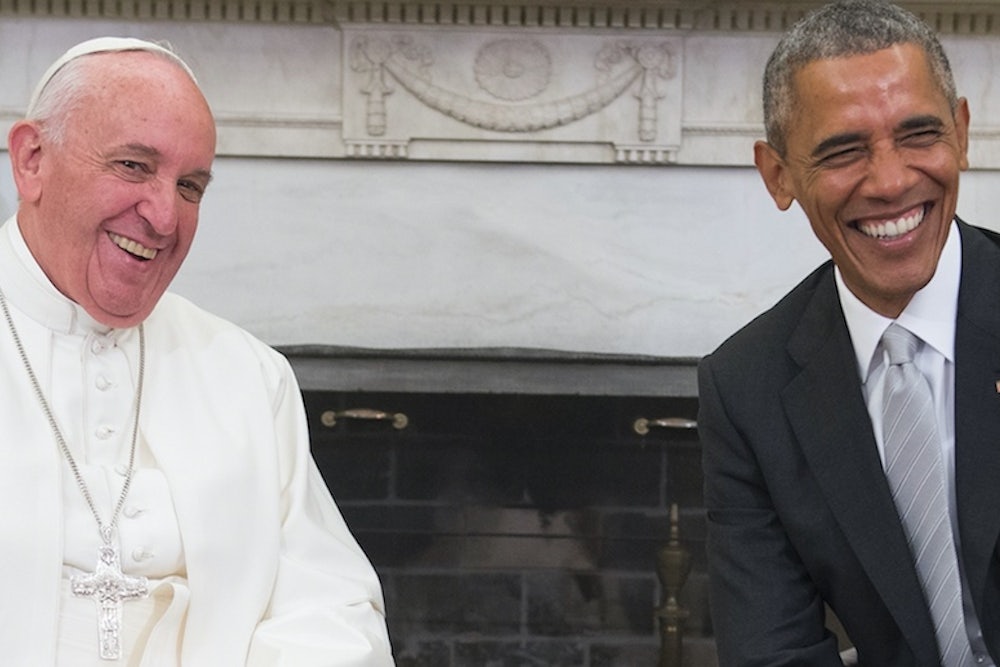
As Pope Francis prepares to address a joint session of Congress on Thursday, many conservatives are preparing for the worst: a speech that marginalizes longstanding Republican and Catholic topics, like abortion and gay marriage, in favor of progressive ideas about climate change, inequality, and immigration. We don’t know what Pope Francis will say on Capitol Hill, of course, but that hasn’t stopped conservatives from trying discredit the Pope’s authority on political issues. Here are a few tactics they're using to try to undermine Francis's allegedly progressive agenda.
Bring up social issues early and often
If Pope Francis isn’t going to foreground social issues like gay marriage and abortion, where conservatives and Catholics typically align, conservatives are going to try to foreground them for him. On Monday, Republican presidential candidate Mike Huckabee slammed the Obama administration for inviting advocates for gay and transgender rights to a welcome ceremony on Wednesday morning. In a statement, Huckabee criticized “President Obama’s classless decision to transform Pope Francis’ visit to the White House into a politicized cattle call for gay and pro-abortion activists is an insult to millions of Catholics.” Despite the over-the-top rhetoric, Huckabee is more or less in line with the Vatican here—according to The Wall Street Journal, Catholic officials are worried that “any photos of the pope with these guests at the White House welcoming ceremony next Wednesday could be interpreted as an endorsement of their activities.” Speaking to CNN later today, John Cornyn embraced this tactic, telling the network, “I think [the Pope] will solidly be on the side of those of us who want to restrict tax dollars going to Planned Parenthood.” It’s not enough that Francis is expected to affirm his pro-life stance when he speaks before Congress—Corryn wants to make sure that this stance is read as an affirmation of the current fight to defund Planned Parenthood. Expect more statements like these as Francis’s speech before Congress approaches.
Talk about the "War on Christians"
Many conservatives believe the “War on Christians,” both at home and abroad, is a far more pressing issue than “worldly” and “political” issues like climate change and inequality. Although Pope Francis has condemned the persecution of Christians in the Middle East before—earlier this summer he compared it to “World War Three”—he is not expected to make the plight of Christians in the Middle East a major point during his U.S. tour. So Republicans will try to wedge it in—and score political points against Obama in the process. In his statement yesterday, Huckabee concluded by asking, “Why is it that Obama goes to extremes to accommodate Muslim terrorists but shows nothing but disdain for Christians? This is a new low for an administration that will go down as the most anti-Christian in American history.” Here, Huckabee wedges a popular right-wing talking point (that Obama loves Muslims and hates Christians) into an unrelated issue (the White House inviting gay and transgender activists to a function honoring the Pope). Expect more conservatives to force this point during the Pope’s U.S. visit.
Remind the public that he's not a scientist or politician
Laudato Si, the papal encyclical on climate change and inequality, was drafted with the help of scientists and has been praised by many within the scientific community. Earlier this summer, for instance, nine scientists writing at Climate Feedback concluded that “Pope Francis’s encyclical rather accurately depicts the current reality of climate change.” Widespread praise from the scientific community hasn’t stopped conservatives from criticizing the Pope for writing a book about a subject he’s not an expert on, however. Instead, many prominent Republicans have attacked Pope Francis’s scientific credibility and suggested that the publication of the Papal encyclical is a political act—and therefore open to political criticism.
In interviews with CNN, a number of Republicans employed this line of attack. "When he wants to take a political position, I will tell you: He is free and clear to be criticized like the rest of us,” Republican Congressman Paul Gosar told the network; "I think it's totally inappropriate that the Pope is weighing in on all the real sensitive, far-left issues," added Senator James Inhofe. "I'm not a Catholic, but my Catholic friends in Oklahoma are not real pleased with it." Republican presidential candidate Chris Christie was just as explicit, telling Jake Tapper on State of the Union, “I just think the Pope is wrong. The fact is that his infallibility is on religious matters, not on political ones.” In other words, Pope Francis’s opinions about climate change are merely that, as they come from a religious leader, not a scientific one. Jeb Bush also took up this line of reasoning but applied it to the Pope’s discussion of economic inequality, telling voters in New Hampshire, “I don’t get economic policy from my bishops or my cardinals.” For conservatives, “leave science to the scientists” is the new “stick to sports” (not that most Republicans to listen to scientists, either, when it comes to climate change).
Argue that progressives misinterpret him
Pope Francis’s politics are obviously more complex than labels like the “progressive pope” suggest. In a piece published yesterday in the National Review Ramesh Ponnuru argues that the Pope has “often” been misquoted and that many of his most popular comments about capitalism and gay rights were shorn of context—that, properly situated, these remarks express ideas that don’t fit as neatly into progressive narratives. Ponnuru goes on to allege that many of the Pope’s comments were either not meant to speak for the Church, presented with an admission of relative ignorance, or simply “cannot stand up to much scrutiny.” When he isn’t being misquoted, Francis is a gaffe machine—instead of the “progressive pope,” he’s the “Joe Biden pope.” Expect more questions about where the Pope falls on the political spectrum and his command of the issues during the Pope’s U.S. visit.
Call him a poseur
In a scathing (and alliterative) op-ed published Sunday in The Washington Post, “Pope Francis’s fact-free flamboyance” George Will begins by accusing the pontiff of only taking an interest in climate change because it’s trendy, writing that the Francis “embraces ideas impeccably fashionable, demonstrably false, and deeply reactionary” with “a convert’s indiscriminate zeal.” The Pope not only isn’t an authority on climate change—he only cares about it because it’s cool.
Imply that he's un-American
In the same op-ed, Will goes on to attack the Pope’s ideas about economic growth:
For most of mankind, however, nature has been, and remains, scarcity, disease and natural—note the adjective—disasters. Our flourishing requires affordable, abundant energy for the production of everything from food to pharmaceuticals. Poverty has probably decreased more in the past two centuries than in the preceding three millennia because of industrialization powered by fossil fuels. Only economic growth has ever produced broad amelioration of poverty, and since growth began in the late 18th century, it has depended on such fuels.
In an op-ed published in The Wall Street Journal yesterday, William McGurn adopts a similar line of attack, writing:
This pope’s assault on the global economy suggests he believes the whole idea fundamentally disordered, leading to a world where competition is exalted over cooperation and people grow rich by exploiting the poor.
Only one problem. Even the most cursory look at the world confirms the opposite: The more fetters imposed on competitive markets, the harder life gets for those stuck at the bottom.
For Will and McGurn, only economic growth can fight poverty, and unfortunately for Francis, economic growth requires lots of fuel—so if the Pope is really serious about fighting poverty, he should embrace conservative economic ideas. Just as importantly, for both these are ideas that are proven to work. By adopting backwards economic policies, Francis will only condemn those he hopes to lift out of poverty to even greater poverty.
The subtext in both op-eds is the same: Yhe Pope is a threat to ideas about regulation, competition, and global markets that America has exported around the world for decades. But Will doesn’t leave it as subtext. In the kicker, he lobs the ultimate conservative insult at the pontiff, writing “He stands against modernity, rationality, science and, ultimately, the spontaneous creativity of open societies in which people and their desires are not problems but precious resources. Americans cannot simultaneously honor him and celebrate their nation’s premises.” The Pope isn’t just wrong about climate change and economics—he’s downright un-American.
Bemoan the decline of faith in Western Civilization
That's Pat Buchanan’s tactic. As Jeet Heer wrote on Tuesday, “the legendary conservative columnist, takes the right-wing hostility toward Francis to its logical conclusion and sees the current Pope, along with President Obama, as being emblematic of the deep sickness in Western civilization.” In Buchanan’s eyes, both Obama and Francis are presiding over fallen institutions, having abandoned eternal values in favor of cultural relativism and liberal democracy: “Every civilization seems to recognize the necessity of faith except for the West, which has lost its faith and is shrinking and dying for lack of it,” Buchanan writes. In many ways, Buchanan is an army of one, but as far as Big Picture criticism of the papal visit goes, it doesn’t get much bigger. The decline of faith in the West under Obama and Francis will be a theme for some during the papal visit (though I doubt anyone will take it up as stridently as Buchanan).
Simply refuse to listen to him
If all else fails, just don’t listen to what the Pope has to say. In an op-ed published in Time, Arizona congressman Paul Gosar announced he was boycotting the Papal address in protest of its presumed focus on climate change. And what should Pope Francis speak about instead?
Many believed, like I did, that this was an opportunity for the Pope to be one of the world’s great religious advocates and address the current intolerance of religious freedom. An opportunity to urgently challenge governments to properly address the persecution and execution of Christians and religious minorities; to address the heinous and senseless murders committed by ISIS and other terrorist organizations. An opportunity to address the enslavement, belittlement, rape and desecration of Christian women and children; to address the condoned, subsidized, intentionally planned genocide of unborn children by Planned Parenthood and society; and finally, an opportunity for His Holiness to refocus our priorities on right from wrong.
In other words, Pope Francis should parrot the Republican Party's tired talking points, or not speak at all.
